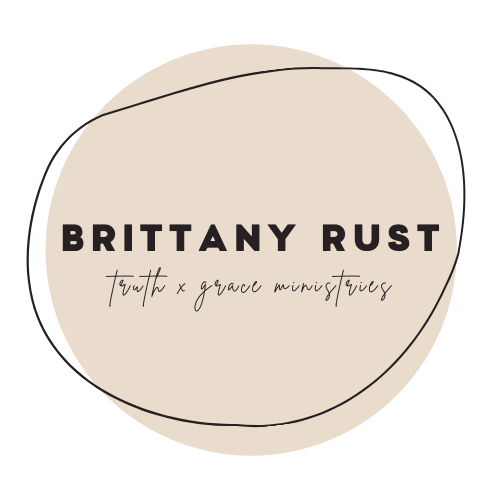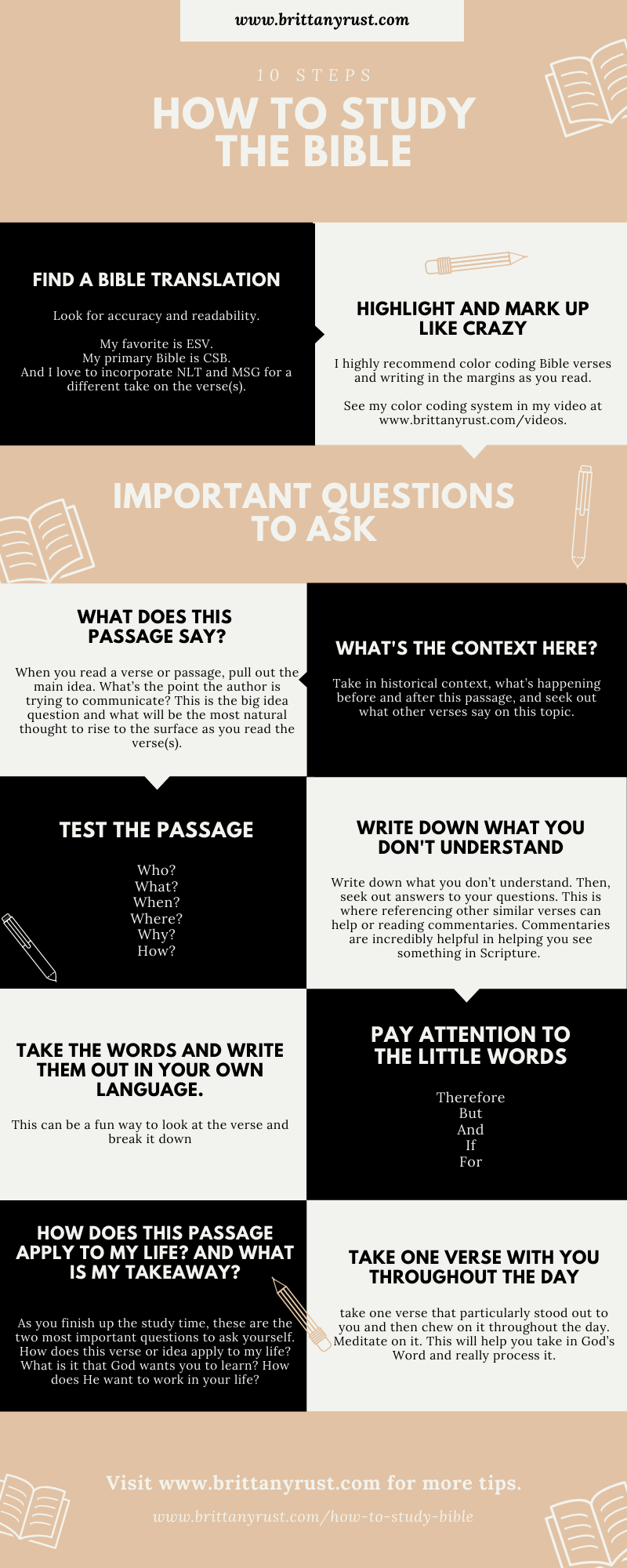How to Study the Bible
“My son, be attentive to my words; incline your ear to my sayings. Let them not escape from your sight; keep them within your heart. For they are life to those who find them, and healing to all their flesh.”
Why It’s Important to Read the Bible
Reading the Bible and diving deep into its content may be a bit overwhelming. Perhaps intimidating, even. But when you take Scripture in regularly, you will be amazed at its power to inspire you and transform your life.
How often, though, should you be in the Word? Are a few times a week enough? How about only when you’re at church?
People who read the Bible 3 times a week or less are no less likely to engage in sin than those who don’t read the Bible at all. Research has shown that the magic number is 4. If you can read the Bible at least 4 times a week, you are roughly 50-75% less likely to engage in sin.
It’s why being in the Word is so important! It’s the only definitive word we have from God Himself. It’s the best way to learn how He thinks, what He has to say, and His desire for your life.
So, with the resolve to be in God’s Word, how do you study the Bible for all its worth? Here are my tips for getting the most out of your study time.
But first, did you know I have the best process for reading the Bible every day? It’s called Wondered by the Word! We read the Bible chronologically in a year. Come join us!
Find a Good Time and Place to Study
It’s important to find what works best for you. A time and place that is free from distraction and where you can be focused. For some people, that will be first thing in the morning. For others, at the end of the day. Or maybe in between at lunch or while your toddler naps.
As a working mom, I know it can be challenging always to set aside time. Before being a mom, I could easily set aside an hour daily for study. As a stay-at-home mom, I was able to fit in about a half-hour during my son’s nap. But now I get a brief period in the morning or I’ll try to get my reading in at night before bed.
I say this because your seasons will change, and with that, your Bible study time will evolve. I’m here to take the pressure off that you may impose on yourself. Bible study doesn’t have to look one way; it will change with the season. Sometimes, it will be short and sweet, and others will be long and steady. As long as you are reading the Bible, if only a few verses, regularly, that’s what is important.
Pray for Understanding
As you go into Bible study, start with prayer. Ask God to give you understanding. He wrote the Word and has all the insight, so invite Him into this time. Relying on yourself or relying on Him, whatever it may be, makes a huge difference!
Studying the Bible for All Its Worth
There are several practical tips I want to share with you that I believe will be helpful in your study time. Find what works for you and implement it into how you study the Bible.
Find a Bible translation. With so many translations out there, it’s important to find one that both reads well and is accurate. I personally prefer the ESV (English Standard Version) because it is considered highly accurate in translation and is easy to read. My primary Bible is ESV. I’ll also refer to NLT (New Living Translation), CSB (Christian Standard Bible), and The Message when I want to look at a verse differently or illuminate the meaning. It’s okay to refer multiple translations as this will perhaps help you see the verse in different ways.
Highlight and mark up like crazy. Highlighting has revolutionized my study time. I have a pack of BIble-friendly highlighters (that don’t leak through easily) and have them out as I read. Each color coordinates with an idea. For instance, I highlight conjunctions in pink; main ideas in green; repeated themes or words in purple; descriptions of or words from God in blue; sins of or responses from people in orange; and verses that particularly ministered to me in teal. I also write out thoughts in the margins or add dates to verses that spoke to my heart in a big way. To see how I do this and for an example, watch my Bible STudy Toolkit Essentials video (link at bottom).
Ask yourself, What does this passage say? When you read a verse or passage, pull out the main idea. What’s the point the author is trying to communicate? This is the big idea question and what will be the most natural thought to rise to the surface as you read the verse(s).
What’s the context here? Context is really important because it’s best not to take a verse alone. Too much incorrect theology has been based on one or two verses and not taking the context into Scripture. So look at what’s happening before the passage you’re reading and what’s happening after. Is the author speaking to an issue within society at that time? If it’s in the Old Testament, what does the New Testament say about that? What do other verses about this topic say? Take in historical context, what’s happening before and after this passage, and seek out what other verses say on this topic. You’ll learn a ton doing this!
Ask questions that test the verse or passage? These are some of the most basic questions, but they are very helpful: who, what, when, where, why, and how? You might even write out each question and answer them with the text you’re reading. Again, this will allow you to dig a little deeper into the passage's meaning.
Write down what you don’t understand. Sometimes, there may be verses or passages that don’t make sense or seem confusing. Write down what you don’t understand. Then, go seek out answers to your questions. This is where referencing other similar verses or reading commentaries can help. Commentaries are incredibly helpful in helping you see something in Scripture. My rule of thumb, though, is to read the passage first and gather as much as you can, then turn to a commentary to help you dig deeper.
Take the words and write them out in your own language. This can be a fun way to analyze the verse and break it down. I certainly wouldn’t recommend sharing that with others as it may confuse some, but certainly, for your own process, break out the passage in a way that resonates with you.
Pay attention to the little words. Conjunctions, or connective words, can be very important in Bible study. Words like “therefore”, “and”, “but”, “if” and “for” can tie together thoughts. I actually will highlight these words in my Bible to help me see how ideas connect. You’ll see this quite a bit in Scripture with “therefore,” and it’s helpful to identify those instances. I also love a good word study. Emily at Hawk and Her has done a great blog on how to do this here.
How does this passage apply to my life? And what is my takeaway? As you finish up the study time, these are the two most important questions to ask yourself. How does this verse or idea apply to my life? What is it that God wants you to learn? How does He want to work in your life? This is where James 1:22-25 applies: “But be doers of the word, and not hearers only, deceiving yourselves. For if anyone is a hearer of the word and not a doer, he is like a man who looks intently at his natural face in a mirror. For he looks at himself and goes away and at once forgets what he was like. But the one who looks into the perfect law, the law of liberty, and perseveres, being no hearer who forgets but a doer who acts, he will be blessed in his doing.” You’d be doing a huge disservice to read the Word but not apply it to your life.
Take one verse with you throughout the day. I close with this, and I often implement this into my daily routine. Oftentimes, you might read several verses and, in that, walk away with several ideas. This may be overwhelming. If this is the case, take one verse that particularly stood out to you and then chew on it throughout the day. Meditate on it. This will help you take in God’s Word and really process it.
My Personal Bible Study Toolkit
When going into your prayer and study time, it’s helpful to have everything you need in one place. I use to have my resources scattered across the house and I’d have to go on a scavenger every day, cutting into my devotion time. Now, I keep everything in one place and I’m ready to go! Here are the tools I use to help my time with God be fruitful and helpful.
Resources I Use:
Diaper Caddy Organizer to hold everything
Journal, which I highly recommend you do as you study. You can write out what you’re going through in life, which is therapeutic, what God is teaching you, and thoughts you have from your Bible study.
My Bible is this ESV Preaching Bible, and I love it. I used to have the She Reads Truth CSB Bible and can recommend it.
Devotionals you are reading. I always keep The Power of a Praying Wife and Triggers: Exchanging Parent’s Angry Reactions for Gentle Biblical Responses in my caddy because I will read a devo from both every day. But then there are also other devotionals I switch out occasionally.
How to Read the Bible for All It’s Worth by Gordon D. Fee and Douglas Stuart
Commentaries: Logos Software and Precept Austin. Logos is a paid software but Precept Austin is free. I also like the Blue Letter Bible app for commentaries and word study.
Bible Friendly Highlighters and a Pen
Index Cards for writing out verses I want to memorize.
Watch my Bible Study Essentials Toolkit video at www.brittanyrust.com/videos.



